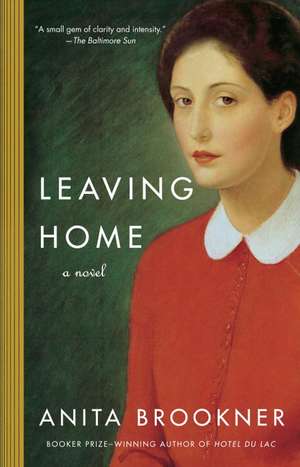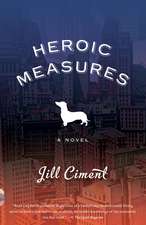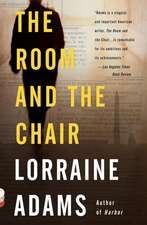Leaving Home
Autor Anita Brookneren Limba Engleză Paperback – 31 ian 2007
Preț: 106.86 lei
Nou
Puncte Express: 160
Preț estimativ în valută:
20.45€ • 21.13$ • 17.02£
20.45€ • 21.13$ • 17.02£
Carte disponibilă
Livrare economică 04-18 martie
Preluare comenzi: 021 569.72.76
Specificații
ISBN-13: 9781400095650
ISBN-10: 1400095654
Pagini: 212
Dimensiuni: 133 x 204 x 15 mm
Greutate: 0.24 kg
Editura: Vintage Books USA
ISBN-10: 1400095654
Pagini: 212
Dimensiuni: 133 x 204 x 15 mm
Greutate: 0.24 kg
Editura: Vintage Books USA
Notă biografică
Anita Brookner was born in London and, apart from several years in Paris, has lived there ever since. She trained as an art historian and taught at the Courtauld Institute of Art until 1988. Leaving Home is her twenty-third novel.
Extras
1 suddenly, from the depths of an otherwise peaceful night, a name erupted from the past: Dolly Edwards, my mother’s friend, a smiling woman with very red lips and a fur coat. I remember the coat because it was not removed for the whole of her visit, which she no doubt intended to be fleeting, having, she implied, much to do. There was another friend from my mother’s prehistory, before I existed, but this presence was less distinct, perhaps not seen at such close quarters. Betty? Betty Pollock? The Pollock seemed shifting, uncertain, an approximation. Maybe that had been her name before she married, for in my mother’s day everyone got married. Women wore their husbands much as they wore their pearl necklaces, or indeed their fur coats. The shame that attached to unmarried women was indelible, and my mother seemed to bear something of that imprint although she was a respectable widow. Dolly Edwards, with her flourishing presence, obviously felt sorry for my mother in her lonely state, with only an eight-year-old child for company. Fortunately my mother did not perceive this, although I did. My mother was impressed by this visit, grateful, even happy. And Dolly Edwards played her part valiantly, reminiscing, producing names unknown to me and rejected by me as having no relevance to my own life. I may even have been jealous of this woman who had known my mother before her anomalous condition was confirmed by the death of my father. Truth to tell she did not much miss him: solitude seemed so much her natural state that Dolly Edwards was not mistaken in making of this a flying visit. My mother marvelled for days over this, with no resentment. It was less a visit than a visitation. It was never repeated.
The other friend, the one I thought of as Betty Pollock, though that might not have been her name, was less opulent, but kinder. This friend we actually journeyed to see, an event so rare that I remembered it. This visit occasioned no wistful comments from my mother, probably because Betty Pollock was not someone of whom she had learned to be slightly afraid. She was even rather unattractive, though clearly was not concerned by this, and in any event her large plain features were transformed by her dazzling smile. The other thing I noted about her was that she was happy. This was mysteriously apparent. I experienced it with relief, though I did not understand it. Now of course I can identify it as a state of steady satisfaction combined with an absence of longing. This must have been less the gift of her husband than of Betty Pollock herself, her smile signalling her contentment with her lot to all within her radius. She too had very red lips, though her hair was grey. She too was eager to reminisce, having nothing to hide. Yet my mother seemed inhibited in her presence, perhaps because of the contrast between them. I think that Betty Pollock vanished from the scene shortly after this visit: her husband was anxious to leave London and move back to Swanage, where he had grown up. I think my mother missed her, though not as much as she missed Dolly Edwards, who remained out of touch.
They had once been part of the same set, though this was a modest suburban affair, formed largely by parents who knew each other as neighbours or friends, and vigilant elder brothers who did duty as escorts when no other was available. I see Dolly as the bold one, Betty as the poor one, and my mother as the beauty, but whose beauty was undermined by an innocence that never left her. She longed for an ideal life which would not betray her, became married because her own mother wished it, and survived widowhood almost as a return to her natural state. I never knew a woman so inactive, her days reserved for reading and thinking. I soon learned not to disturb either process. Yet I think she was lonely, a perception that filled me with distress. We loved each other greatly, yet so exclusive was that love that it was experienced more like anguish. That feeling has remained with me and will no doubt survive all the rest.
It was therefore somehow appropriate that she should die and leave me bereft, and also appropriate, though unforeseen, that I should attach myself to a surrogate—though not a surrogate mother—whom I saw as capable of acting as a mentor. This was not a subject on which I was anxious to dwell, although it had no doubt accounted for my current wakefulness. That this wakefulness had produced only the completely irrele- vant name of Dolly Edwards was one of those connections that the unconscious chose to make ahead of and perhaps more comprehensively than anything achieved by deliberate attention. Dolly Edwards was an associate, however negligent, of my mother. My mother was somehow not viable. It had become necessary for me to look for safety elsewhere, owing to my mother’s frailty, her reclusive habits, and her early demise. At all times I had been fearful of leaving home in case something should happen to her. Yet leaving home had become a necessity, although a painful one, if ever I were to find freedom. The unconscious had a complete network installed: I had only to be patient and all would be revealed. I tried to work out the significance of what my abrupt awakening had tried to tell me. When the information came through it was not surprising: I had to undertake a journey. I had to leave home. If I had switched on the light I would have seen my travel bag, half filled, resting against my bedroom chair. What was marvel- lous about this was not the way in which the information had reached me but the fact that the entire process—waking, remembering, and finally coming to full consciousness—had taken no more than a few minutes, or even seconds. My impression of an endless night was erroneous, proof once again of the dark hinterland that produces our more useful understanding.
The circuitry was admirable. My eight-year-old self had seen that my mother had somehow been let down by her old friends. In Dolly Edwards’s case this was easily explained: she was confident and affluent (the fur coat) and my mother was neither. Betty Pollock was a happy and satisfied woman, as even I had perceived: again, my mother was neither. In the days that succeeded these two encounters, disappointment had turned to sadness at her own inability to advance, and in the shadow of that sadness, only contained, only bearable if left undisturbed, I felt doomed to follow if I were not to make some sort of independent outbreak of my own, and on my own behalf. My best chance would lie in finding another source of authority, another agent of influence. I did not know whether this could be allowed, let alone arranged. It would be a journey away from home, symbolic no doubt but nonetheless real for all that. In any event it would have to be managed, and managed, if possible, without disloyalty, more or less invisibly, above all in good faith. I remain convinced that this is a critical task but not one which brings with it a resounding sense of victory.
In my own life very little has changed. I am older now, of course. I live alone, in a small flat, with the instinctive frugality of those who live alone, financially secure though never extravagant. I sit and write the book on which I have been working for some years now and which is almost finished, much to my publisher’s surprise. In fact, despite the many delays, this tactic has served me rather well. The book is always immanent, but not in a position to be judged. The larval nature of the book pleases both one’s friends and one’s rivals. When questioned about its progress one responds with a certain smile, a smile that implies secret activity, and replies, quite truthfully, that one seems to have collected a great deal of material, so much so that the book may turn out to be more substantial than anticipated. I have seen this technique used to great effect by the worldly, so that the very absence of the book is more potent than its presence could ever be. In my case I can only plead an anxious sincerity: there is a great deal of material, and sometimes it seems that there will always be a reason for me to undertake one more journey, to revisit familiar sites and walk once again in deserted gardens, the only visitor on grey autumn mornings, until I realize that my work is truly finished. And that may be a very sad day.
My departures are all the same now, accomplished without difficulty but with a certain philosophical fatigue. Once I would have gone anywhere, strenuously; now I tend to go to the same places, which I know well, too well perhaps. I also see a few friends who have survived our now separate lives. Once we were familiars; now we are merely figures in the same landscape, and what had once been eagerness has become obligation. There is no blame attaching to this; the trajectory had been designed by the unconscious, a long time ago. But the unconscious does not rule the world, does not even illuminate it, apart from these brief fragments of understanding. It is, after all, only part of the self. The other part, the most important, is subject to the will. But it is also subject to the will of others.
From the Hardcover edition.
The other friend, the one I thought of as Betty Pollock, though that might not have been her name, was less opulent, but kinder. This friend we actually journeyed to see, an event so rare that I remembered it. This visit occasioned no wistful comments from my mother, probably because Betty Pollock was not someone of whom she had learned to be slightly afraid. She was even rather unattractive, though clearly was not concerned by this, and in any event her large plain features were transformed by her dazzling smile. The other thing I noted about her was that she was happy. This was mysteriously apparent. I experienced it with relief, though I did not understand it. Now of course I can identify it as a state of steady satisfaction combined with an absence of longing. This must have been less the gift of her husband than of Betty Pollock herself, her smile signalling her contentment with her lot to all within her radius. She too had very red lips, though her hair was grey. She too was eager to reminisce, having nothing to hide. Yet my mother seemed inhibited in her presence, perhaps because of the contrast between them. I think that Betty Pollock vanished from the scene shortly after this visit: her husband was anxious to leave London and move back to Swanage, where he had grown up. I think my mother missed her, though not as much as she missed Dolly Edwards, who remained out of touch.
They had once been part of the same set, though this was a modest suburban affair, formed largely by parents who knew each other as neighbours or friends, and vigilant elder brothers who did duty as escorts when no other was available. I see Dolly as the bold one, Betty as the poor one, and my mother as the beauty, but whose beauty was undermined by an innocence that never left her. She longed for an ideal life which would not betray her, became married because her own mother wished it, and survived widowhood almost as a return to her natural state. I never knew a woman so inactive, her days reserved for reading and thinking. I soon learned not to disturb either process. Yet I think she was lonely, a perception that filled me with distress. We loved each other greatly, yet so exclusive was that love that it was experienced more like anguish. That feeling has remained with me and will no doubt survive all the rest.
It was therefore somehow appropriate that she should die and leave me bereft, and also appropriate, though unforeseen, that I should attach myself to a surrogate—though not a surrogate mother—whom I saw as capable of acting as a mentor. This was not a subject on which I was anxious to dwell, although it had no doubt accounted for my current wakefulness. That this wakefulness had produced only the completely irrele- vant name of Dolly Edwards was one of those connections that the unconscious chose to make ahead of and perhaps more comprehensively than anything achieved by deliberate attention. Dolly Edwards was an associate, however negligent, of my mother. My mother was somehow not viable. It had become necessary for me to look for safety elsewhere, owing to my mother’s frailty, her reclusive habits, and her early demise. At all times I had been fearful of leaving home in case something should happen to her. Yet leaving home had become a necessity, although a painful one, if ever I were to find freedom. The unconscious had a complete network installed: I had only to be patient and all would be revealed. I tried to work out the significance of what my abrupt awakening had tried to tell me. When the information came through it was not surprising: I had to undertake a journey. I had to leave home. If I had switched on the light I would have seen my travel bag, half filled, resting against my bedroom chair. What was marvel- lous about this was not the way in which the information had reached me but the fact that the entire process—waking, remembering, and finally coming to full consciousness—had taken no more than a few minutes, or even seconds. My impression of an endless night was erroneous, proof once again of the dark hinterland that produces our more useful understanding.
The circuitry was admirable. My eight-year-old self had seen that my mother had somehow been let down by her old friends. In Dolly Edwards’s case this was easily explained: she was confident and affluent (the fur coat) and my mother was neither. Betty Pollock was a happy and satisfied woman, as even I had perceived: again, my mother was neither. In the days that succeeded these two encounters, disappointment had turned to sadness at her own inability to advance, and in the shadow of that sadness, only contained, only bearable if left undisturbed, I felt doomed to follow if I were not to make some sort of independent outbreak of my own, and on my own behalf. My best chance would lie in finding another source of authority, another agent of influence. I did not know whether this could be allowed, let alone arranged. It would be a journey away from home, symbolic no doubt but nonetheless real for all that. In any event it would have to be managed, and managed, if possible, without disloyalty, more or less invisibly, above all in good faith. I remain convinced that this is a critical task but not one which brings with it a resounding sense of victory.
In my own life very little has changed. I am older now, of course. I live alone, in a small flat, with the instinctive frugality of those who live alone, financially secure though never extravagant. I sit and write the book on which I have been working for some years now and which is almost finished, much to my publisher’s surprise. In fact, despite the many delays, this tactic has served me rather well. The book is always immanent, but not in a position to be judged. The larval nature of the book pleases both one’s friends and one’s rivals. When questioned about its progress one responds with a certain smile, a smile that implies secret activity, and replies, quite truthfully, that one seems to have collected a great deal of material, so much so that the book may turn out to be more substantial than anticipated. I have seen this technique used to great effect by the worldly, so that the very absence of the book is more potent than its presence could ever be. In my case I can only plead an anxious sincerity: there is a great deal of material, and sometimes it seems that there will always be a reason for me to undertake one more journey, to revisit familiar sites and walk once again in deserted gardens, the only visitor on grey autumn mornings, until I realize that my work is truly finished. And that may be a very sad day.
My departures are all the same now, accomplished without difficulty but with a certain philosophical fatigue. Once I would have gone anywhere, strenuously; now I tend to go to the same places, which I know well, too well perhaps. I also see a few friends who have survived our now separate lives. Once we were familiars; now we are merely figures in the same landscape, and what had once been eagerness has become obligation. There is no blame attaching to this; the trajectory had been designed by the unconscious, a long time ago. But the unconscious does not rule the world, does not even illuminate it, apart from these brief fragments of understanding. It is, after all, only part of the self. The other part, the most important, is subject to the will. But it is also subject to the will of others.
From the Hardcover edition.
Recenzii
"A small gem of clarity and intensity. Her latest, Leaving Home, promises--and delivers--the savory experience devotees of Brookner have come to crave." —The Baltimore Sun
"Yet another delicious reading experience. Her elegant prose and psychological acuity are fully on display. . . . As a narrator Emma is both clear-eyed and honest--often achingly so."
—The Christian Science Monitor
"Beautiful, piercingly elegant." —New York Times Book Review
“It’s hard to pinpoint how Brookner’s world differs from the one we know, since the minute we begin reading her fiction, we lose our awareness of the boundaries that separate us from the people whose often circumscribed lives she is so deftly describing. . . . Admirable and refreshing.” —Bookforum
"Yet another delicious reading experience. Her elegant prose and psychological acuity are fully on display. . . . As a narrator Emma is both clear-eyed and honest--often achingly so."
—The Christian Science Monitor
"Beautiful, piercingly elegant." —New York Times Book Review
“It’s hard to pinpoint how Brookner’s world differs from the one we know, since the minute we begin reading her fiction, we lose our awareness of the boundaries that separate us from the people whose often circumscribed lives she is so deftly describing. . . . Admirable and refreshing.” —Bookforum
Descriere
In her exquisite new novel, Brookner deals with one of the great dramas of one's life: growing up and leaving home. At 26, Emma Roberts comes to the painful realization that if she is ever to become truly independent, she must leave her comfortable London flat and venture out into the wider world.
















